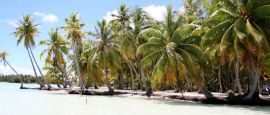The Islands of Tahiti History, Language and Culture
History of The Islands of Tahiti
The first Europeans to arrive on the island groups were 16th-century Spanish and Portuguese explorers. The British, notably Captain Cook and later Captain Bligh (of 'HMS Bounty' notoriety), and then the French, took control of the islands in the 18th and 19th century respectively. Tahiti, the largest island in French Polynesia, was made a French protectorate in 1842 and a colony in the 1880s. The other islands were annexed by the turn of the century. This status quo remained until 1946, when Polynesia was made an Overseas Territory.
A revised constitution, introduced in 1977, ceded greater autonomy. For the next 20 years, the islands' politics were dominated by the French nuclear testing programme. By the time the programme ended in 1996, 193 separate explosions had been detonated, mainly on the atoll of Mururoa. In general, the French government was able to rely on the firm backing of most of the French public opinion and an often ambivalent attitude on the part of the inhabitants of French Polynesia, who were well aware of the considerable benefits of the test programme to the otherwise threadbare local economy. The tests had begun in 1966, but it was not until the 1980s that opposition to them began to assume significant proportions, following the terrorist attack by French Special Forces on the Greenpeace vessel Rainbow Warrior. By the time of the final series of tests in 1995/6, Tahiti had become the focus of opposition from throughout the South Pacific, and several riots occurred.
Although the protesters failed to stop the tests, their campaign had an important political effect by linking the anti-nuclear movement and the burgeoning pro-independence movement which had so far been largely unrepresented in any political forum, despite the support of a large proportion (possibly the majority) of the population. The politics of the territory had been dominated for the previous decade by the centre-right Tahoera'a Huiraatira (TH) party, led by Gaston Flosse, allied to the French Gaullist Rassemblement pour la République (RPR), which backed French rule and nuclear testing.
In more recent years, changes have been afoot: The Islands of Tahiti gained Overseas Country (pays d'outre-mer or POM) status in 2004, and a few months later, pro-independence leader Oscar Temaru was elected. Since then, Tahiti has seen a few more presidents, with Édouard Fritch assuming office in 2014.




 You know where
You know where